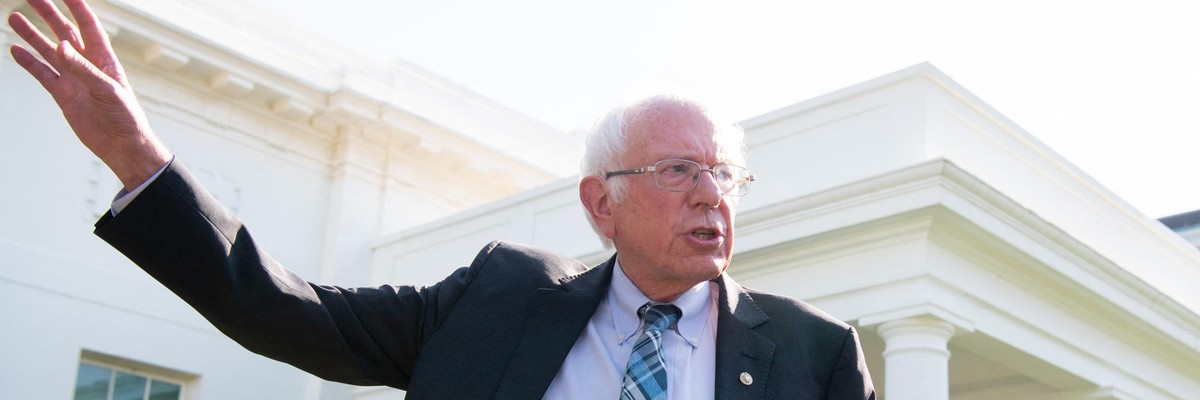

SUBSCRIBE TO OUR FREE NEWSLETTER
Daily news & progressive opinion—funded by the people, not the corporations—delivered straight to your inbox.
5
#000000
#FFFFFF
To donate by check, phone, or other method, see our More Ways to Give page.


Daily news & progressive opinion—funded by the people, not the corporations—delivered straight to your inbox.

U.S. Sen. Bernie Sanders (I-Vt.) speaks to the media outside the West Wing of the White House in Washington, D.C. on July 12, 2021, after attending a meeting with President Joe Biden. (Photo: Saul Loeb/AFP via Getty Images)
\u201cThere's a big disconnect between the corporate media and working people. Across America, people work 50-60 hours a week, can't afford child care, have no health care, and they turn on the TV and the media says 'everything is great!' because corporations are making record profits.\u201d— Bernie Sanders (@Bernie Sanders) 1633386300
"When we talk about big money controlling this country, it's not only the direct political process but it's how we even learn about what's going on in this country."
--Sen. Bernie Sanders
\u201cMaybe, if youre lucky, expanded dental, vision and hearing coverage, universal pre-K, expanding Medicare, 2 years of free community college, will be brought up in paragraph 7. The framing is all about jockeying between political forces, no sense of the human impact on poverty\u201d— Adam H. Johnson (@Adam H. Johnson) 1633393933
Donald Trump’s attacks on democracy, justice, and a free press are escalating — putting everything we stand for at risk. We believe a better world is possible, but we can’t get there without your support. Common Dreams stands apart. We answer only to you — our readers, activists, and changemakers — not to billionaires or corporations. Our independence allows us to cover the vital stories that others won’t, spotlighting movements for peace, equality, and human rights. Right now, our work faces unprecedented challenges. Misinformation is spreading, journalists are under attack, and financial pressures are mounting. As a reader-supported, nonprofit newsroom, your support is crucial to keep this journalism alive. Whatever you can give — $10, $25, or $100 — helps us stay strong and responsive when the world needs us most. Together, we’ll continue to build the independent, courageous journalism our movement relies on. Thank you for being part of this community. |
\u201cThere's a big disconnect between the corporate media and working people. Across America, people work 50-60 hours a week, can't afford child care, have no health care, and they turn on the TV and the media says 'everything is great!' because corporations are making record profits.\u201d— Bernie Sanders (@Bernie Sanders) 1633386300
"When we talk about big money controlling this country, it's not only the direct political process but it's how we even learn about what's going on in this country."
--Sen. Bernie Sanders
\u201cMaybe, if youre lucky, expanded dental, vision and hearing coverage, universal pre-K, expanding Medicare, 2 years of free community college, will be brought up in paragraph 7. The framing is all about jockeying between political forces, no sense of the human impact on poverty\u201d— Adam H. Johnson (@Adam H. Johnson) 1633393933
\u201cThere's a big disconnect between the corporate media and working people. Across America, people work 50-60 hours a week, can't afford child care, have no health care, and they turn on the TV and the media says 'everything is great!' because corporations are making record profits.\u201d— Bernie Sanders (@Bernie Sanders) 1633386300
"When we talk about big money controlling this country, it's not only the direct political process but it's how we even learn about what's going on in this country."
--Sen. Bernie Sanders
\u201cMaybe, if youre lucky, expanded dental, vision and hearing coverage, universal pre-K, expanding Medicare, 2 years of free community college, will be brought up in paragraph 7. The framing is all about jockeying between political forces, no sense of the human impact on poverty\u201d— Adam H. Johnson (@Adam H. Johnson) 1633393933